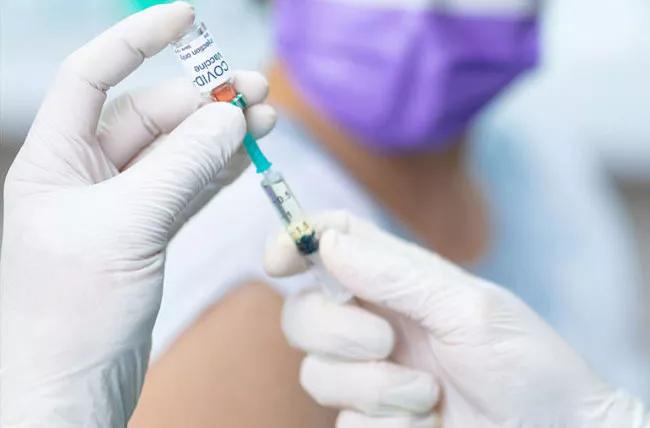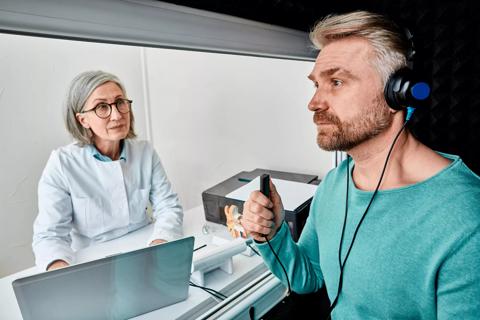Advertisement
No, the vaccine will not alter your DNA or give you COVID-19

Even if you understand the scientific process, trust medical experts and know how important vaccines are for fighting infectious diseases, you might still have some questions or concerns about the new COVID-19 vaccines — especially with so many rumors floating around online.
Advertisement
Cleveland Clinic is a non-profit academic medical center. Advertising on our site helps support our mission. We do not endorse non-Cleveland Clinic products or services. Policy
It’s normal and healthy to have questions, says Thaddeus Stappenbeck, MD, PhD, Chairman of the Department of Inflammation and Immunity at Cleveland Clinic’s Lerner Research Institute.
“These are new therapeutics, and it’s totally reasonable to ask constructive questions with an open mind,” he reassures.
That said, it’s also important to seek out trusted sources of information. Here, Dr. Stappenbeck helps set the record straight on some common questions, concerns and myths that have emerged about COVID-19 vaccines.
Vaccines prime your immune system to recognize and fight off viruses, but they don’t actually cause an infection.
The Moderna and Pfizer COVID-19 vaccines contain a strand of genetic material called messenger RNA, or mRNA. When the mRNA enters your cells, it instructs them to make a piece of the “spike” protein that’s present on the coronavirus that causes COVID-19. Those protein pieces don’t actually harm your body, but they do trigger your immune system to mount a response to fight them off.
The Johnson & Johnson’s COVID-19 vaccine delivers DNA that encodes the spike protein, but it is delivered by another type of virus that is safe.
You might have some fatigue, muscle aches, a headache or fever after you get the vaccine. That’s normal with any vaccine — and it’s a sign that your immune system is responding.
The first vaccines for COVID-19 do involve new technology, and they were developed in record time. But it’s not because there were shortcuts in the process.
Advertisement
Again, messenger RNA, or mRNA, is the new technology at the center of Pfizer’s and Moderna’s COVID-19 vaccines. While this is the first time it’s being widely used in a vaccine for the public, researchers have actually been working on this vaccine strategy for more than three decades.
“It was a lucky thing that the technology has been robustly developed quite well over the last few years and tested in several animal models of infection, so we knew that it was safe and worked quite well in these animal models,” Dr. Stappenbeck says. “When COVID-19 came around, this was an obvious opportunity to use this novel technology, and vaccine developers were poised to do it.”
The companies put their vaccines through rigorous clinical trials involving tens of thousands of volunteers. In the U.S., the Food and Drug Administration requires them to follow up with volunteers for up to two years after receiving the vaccines to make sure they are safe and effective. Because of how prevalent COVID-19 is, it only took a few months for the clinical trials to collect enough data to make an initial evaluation.
The FDA and an independent panel of vaccine experts closely scrutinized the data from those trials and deemed Pfizer’s and Moderna’s vaccines safe and effective for emergency use (and the Pfizer vaccine has now received full FDA approval). Similar independent panels in several other countries are in agreement.
All three U.S. vaccine makers have published the ingredient lists for their vaccines, available on their websites. The CDC’s website also tells you what’s in the COVID-19 vaccines.
The star ingredient is the COVID-19 mRNA (in Modern and Pfizer) or DNA (in Johnson & Johnson) for the spike protein. Both vaccines also contain lipids (fats) that help deliver the mRNA into your cells and a few other common ingredients that help maintain the pH and stability of the vaccine.
Despite theories circulated on social media, none of the COVID-19 vaccines contain microchips or any form of tracking device.
This myth is especially targeted at the Pfizer and Moderna vaccines — but the bottom line is that none of the COVID-19 vaccines can alter your DNA.
Both vaccines use mRNA to instruct our cells to make a piece of the coronavirus’s hallmark spike protein to spark an immune system response. Once the mRNA does that, our cells break it down and get rid of it.
“Messenger RNA is something that’s made from DNA, but it’s not designed to integrate with our DNA, and it doesn’t permanently change our genome and who we are in any way,” Dr. Stappenbeck says.
It’s very possible to get COVID-19 more than once. Your body’s immunity from infection wanes over time, so the antibodies it created when you recovered from coronavirus won’t protect you from reinfection in the long term.
But vaccination may. Data indicates that the vaccine provides longer protection than natural infection, showing that unvaccinated people are 2.34 times more likely to be reinfected with COVID-19 than those who are fully vaccinated.
So far, breakthrough cases are possible but somewhat uncommon, particularly in vaccinated people who have recovered from the virus. But this is quickly changing, as the percentage of breakthrough cases is increasing to a rate higher than anticipated. A third vaccination may be required.
It’s true that most people who get COVID-19 can recover. But it’s also true that some people develop severe complications.
Advertisement
The World Health Organization reports that so far, about 4.4 million people around the world have died from COVID-19 — and that doesn’t account for people who survived but needed to be hospitalized. Because the disease can damage the lungs, heart and brain, it may also cause long-term health problems that experts are still working to understand.
There’s another reason to get the vaccine: It protects others. Even if COVID-19 doesn’t make you very sick, you could pass it on to someone else who might be more severely affected. Widespread vaccination protects populations, including those who are most at risk and those who can’t be vaccinated.
Because the COVID-19 vaccines don’t contain the live virus (remember, it’s an mRNA vaccine), they are not thought to cause an increased risk of infertility, first or second-trimester loss, stillbirth or congenital anomalies. Additionally, there is no evidence to suggest that the vaccine is a risk to a breastfeeding baby.
Doctors believe it is safe to get the COVID-19 vaccine if you’re pregnant, and the CDC strongly encourages pregnant people (and those who wish to become pregnant) to receive the COVID-19 vaccine.
Even after being vaccinated, you should continue to wear a mask around others, wash your hands and practice physical distancing. There are a few reasons for this.
The first is that both of the authorized vaccines require two doses given three to four weeks apart to achieve the best possible immunity. When you get your first shot, you don’t become immediately immune.
“It takes at least a week to 10 days for your body to begin to develop antibodies, and then those antibodies continue to increase over the next several weeks,” Dr. Stappenbeck says.
Advertisement
The second reason is that these vaccines were developed and tested for their ability to prevent severe illness and death from COVID-19 — but they may not protect against asymptomatic infection and spread.
“I would love to say that we’re going to flip a switch and everything’s going to be back to normal, but it’s actually going to take a long time,” Dr. Stappenbeck says.
To achieve what’s called herd immunity – the point at which the disease is no longer likely to spread – about 85% of the population will need to have been vaccinated or infected, he says. But continued vaccine hesitancy, among other issues, has slowed our chances of reaching that point.
The CDC reports that about 57% of the total U.S. population has been fully vaccinated, and vaccination rates have slowed. In the meantime, the virus continues to mutate, and new variants — including the delta variant that is dominant around the world — continue to wreak havoc on the unvaccinated population, including children.
“For now, all of us, including vaccinated people, should continue to help slow the spread of the virus, including wearing a mask, washing our hands and physical distancing,” Dr. Stappenbeck says.
If you have more questions about the vaccine, talk with your trusted healthcare provider or look to reliable sources like the Centers for Disease Control and Prevention or the World Health Organization.
Advertisement
Learn more about our editorial process.
Advertisement

Most routine vaccines are safe for people living with multiple sclerosis — but be sure to talk with your care team about your needs

The medication is ineffective and — in the case of animal ivermectin — potentially dangerous

Updated vaccinations are recommended to better protect against the evolving virus

Enteroviruses are often to blame for summer colds, leading to a runny nose, sore throat and digestive symptoms

Redness, swelling, itching and rash can happen when your body’s immune system reacts to the vaccine injection

Studies suggest 1 in 5 people infected with the coronavirus never develop symptoms

An increased risk of blood clots can last for nearly a year after a COVID-19 diagnosis

COVID-19 may be associated with tinnitus, but research is still ongoing

Focus on your body’s metabolic set point by eating healthy foods, making exercise a part of your routine and reducing stress

PFAS chemicals may make life easier — but they aren’t always so easy on the human body

While there’s little risk in trying this hair care treatment, there isn’t much science to back up the claims